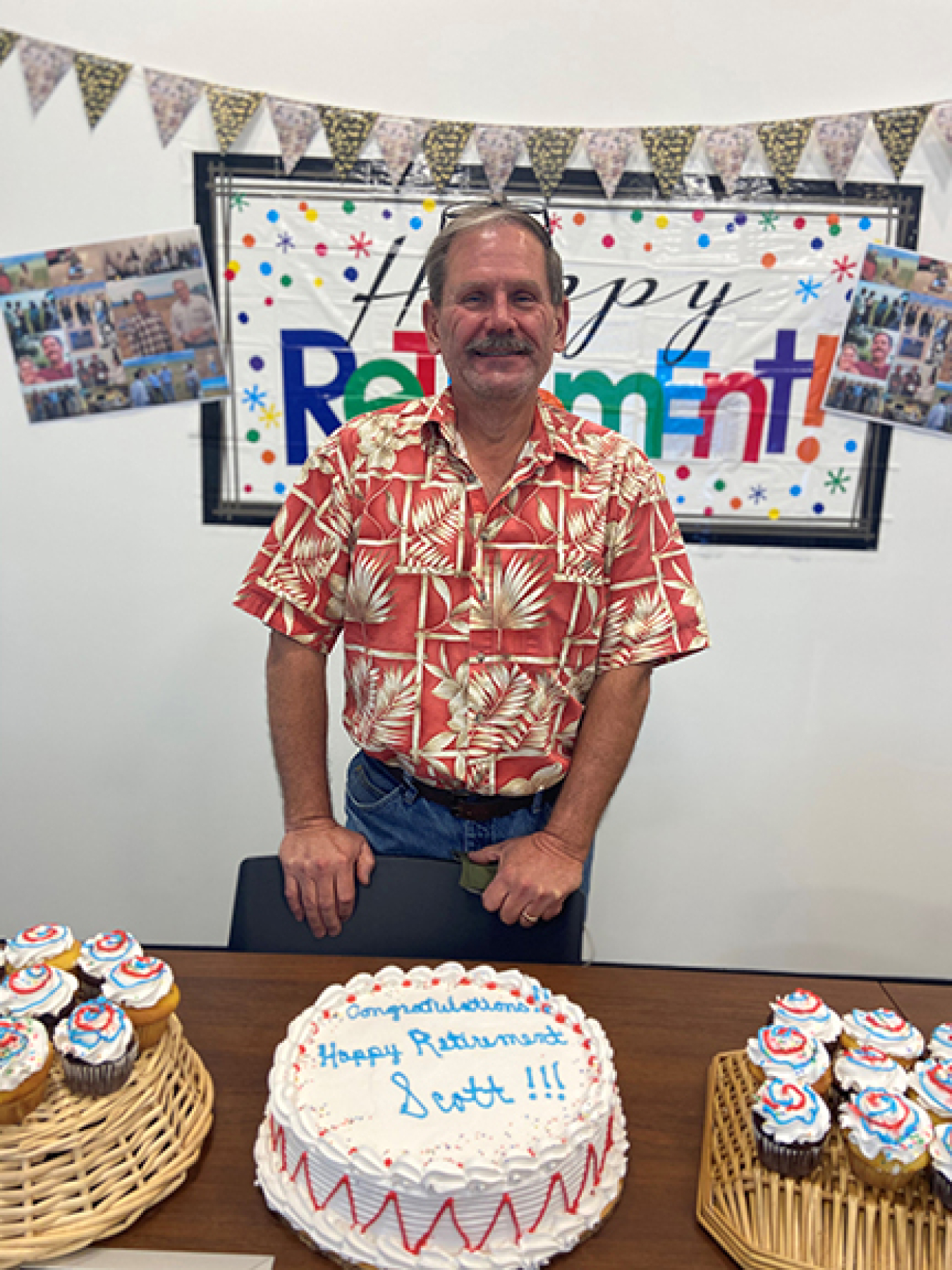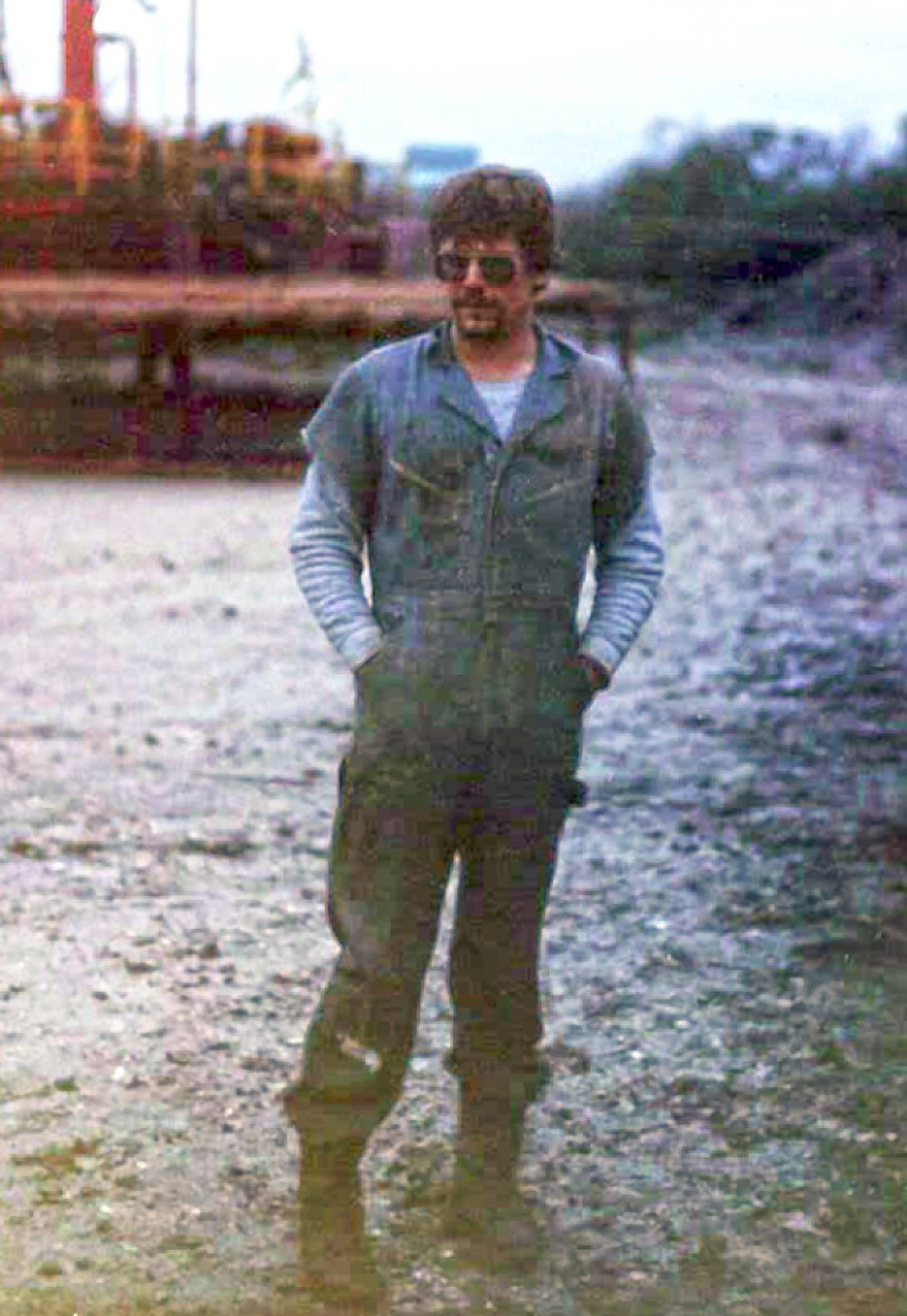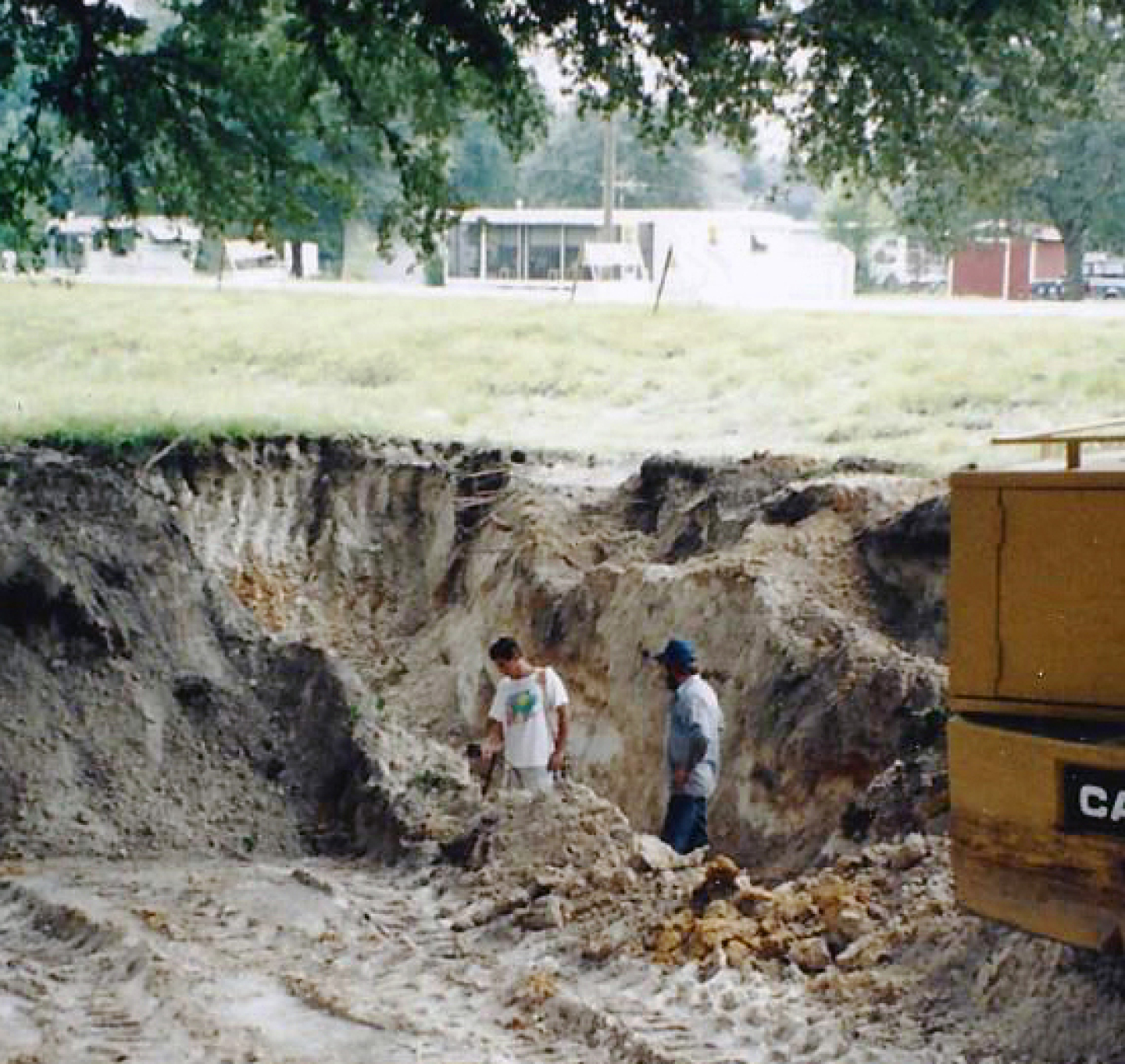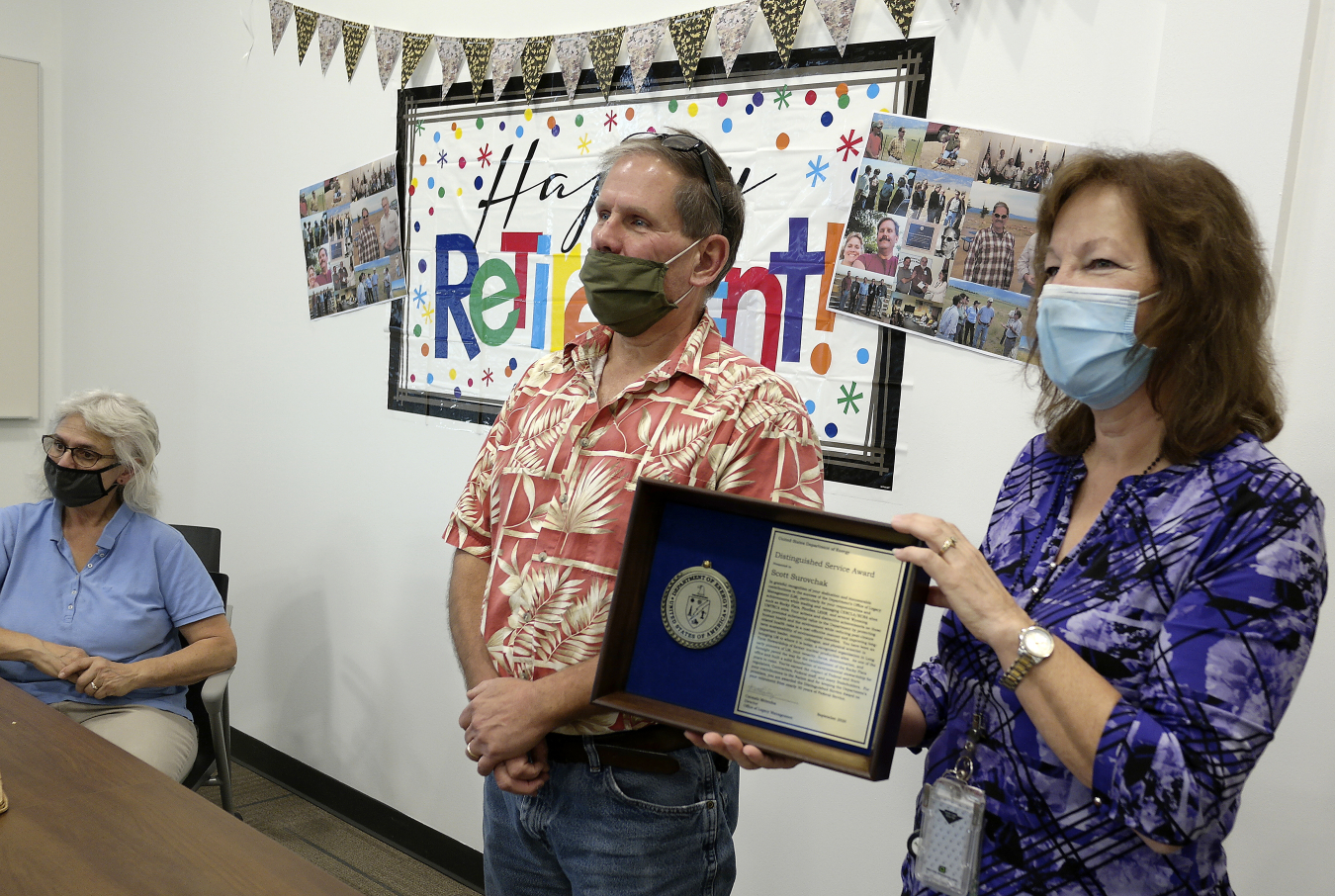LM celebrates Site Manager Scott Surovchak’s contributions to DOE.
October 5, 2020
Surovchak at his September virtual retirement party.
These days, if you strike up a conversation with Scott Surovchak, he may take a moment to brag about his two-year-old grandson and how he remembers every detail he sees and hears. That apple didn’t fall far from the family tree — Surovchak also has impressive recollection, especially when it comes to his 29-year career with the U.S. Department of Energy (DOE). Although Surovchak retired in September as site manager for multiple DOE Office of Legacy Management (LM) sites, his impact on DOE will carry on for decades to come.
Surovchak developed his hard work ethic in the Texas oil and gas industry back in the early 1980s. He fondly remembers his first jobs, where he worked 12 to 18 hours a day in drilling, both offshore and onshore.

Surovchak in the early 1980s after he’d finished performing the dirty duty of “tripping pipe,” or pulling drill string out of a wellbore to replace worn drill bits and then running it back in.
After a few years, Surovchak was laid off as part of the 1980s oil bust. So, he loaded everything he owned into his diesel pickup truck and moved to Florida.
“I had grandiose plans of attending the University of South Florida because they had a really good groundwater program,” explained Surovchak. “But I needed a job. I couldn’t just be a student.”
His professor hooked him up with a job right away, and Surovchak pursued a degree in hydrogeology while working as an environmental consultant.
After working 10 years for private companies, Surovchak accepted his first DOE position with the Office of Environmental Management (EM) in 1991, working in environmental reclamation at the Savannah River Site (SRS) in South Carolina.
“This was near the start of EM, and they didn’t really have anyone who knew about groundwater remediation except me. I started working with a few sites, and I ended up with about 75% of the sites managing environmental restoration waste,” said Surovchak.

Surovchak performs environmental field work with a coworker in Florida in the late 1980s.
While Surovchak loved working at SRS, he became interested in the former Rocky Flats Plant near Denver, Colorado, after learning about it from a colleague. That colleague offered Surovchak a job at Rocky Flats, which he accepted. He made the move to work at the plant in 1992, sight unseen.
When Surovchak arrived, the former Rocky Flats Plant was in the process of resuming operations following a 1989 plantwide safety shutdown. Surovchak’s first assignment was a daunting one — reviewing costs used to calculate a fine issued to Rockwell International Corporation, the DOE contractor at the time, for violating federal hazardous waste law and the federal Clean Water Act. The resulting fine was $18.5 million. This assignment didn’t make Surovchak the most popular person on site — one deputy director wouldn’t even let Surovchak enter his office. But Surovchak understood the reason for getting cold shoulders from coworkers, and he wasn’t bothered by it.
After President George H. W. Bush canceled the W-88 Trident Warhead Program in 1992, the plant shifted from operations to closure. Surovchak eventually moved back into environmental restoration, continuing his work at the plant into 2003. When an impending layoff was on the horizon, Surovchak again planned to pack up everything he owned, this time with his sights set on The Last Frontier state.
“I knew I didn’t have seniority, and I was cool with that. I came from consulting, where you’re always working yourself out of a job” Surovchak remembers. “I knew I was on the layoff list, and I was ready to pack up my fifth wheel and head to Alaska.”
This time, fate took a different turn, and Surovchak was offered a position with the newly created DOE Office of Legacy Management (LM). In early 2004, Surovchak became the LM representative at the former plant, now known as the Rocky Flats Environmental Technology Site, eventually becoming LM’s lead to transition the site from EM. The Rocky Flats Site transferred to LM in 2005.
In 2006, in addition to becoming the Rocky Flats site manager, Surovchak inherited all the LM Uranium Mill Tailings Radiation Control Act of 1978 Title I and II Disposal and Processing Sites in Wyoming, which were transferring from EM to LM.
Surovchak also took over as site manager for the Pinellas County, Florida, Site in 2010. In 2016, portions of the site were given a conditional Site Rehabilitation Completion Order (SRCO). In 2018, LM received an unconditional SRCO (clean closure) for the 4.5 Acre Site, an adjacent property that was sold to a private owner in 1972. The closure order specified that DOE no longer had any responsibilities for the property, and the landowner had full and unrestricted use of the property. It was the first unconditional closure for an LM site.
Surovchak admitted he will miss his Pinellas site work the most.
“It’s a different site because the [federal] government doesn’t own anything there,” explained Surovchak. “The county owns the property, and we operate in partnership with the county and all the affected property owners. It really works well.”

Environmental Team Supervisor Gwen Hooten presents Surovchak with a DOE Distinguished Service Award on Sept. 30, 2020.
Now that he’s embracing retirement life, he’s ready to give his full attention to home projects, hunting, travelling in his RV, and family activities.
“I haven’t quite figured out what I want to do when I grow up,” said Surovchak. “But I most look forward to having the time to do the things I want to do, versus trying to fit it into my work schedule.”
With a long list of interests to explore and projects to work on, plus two young grandchildren and the expectation of more to come, Surovchak has a great path forward.

